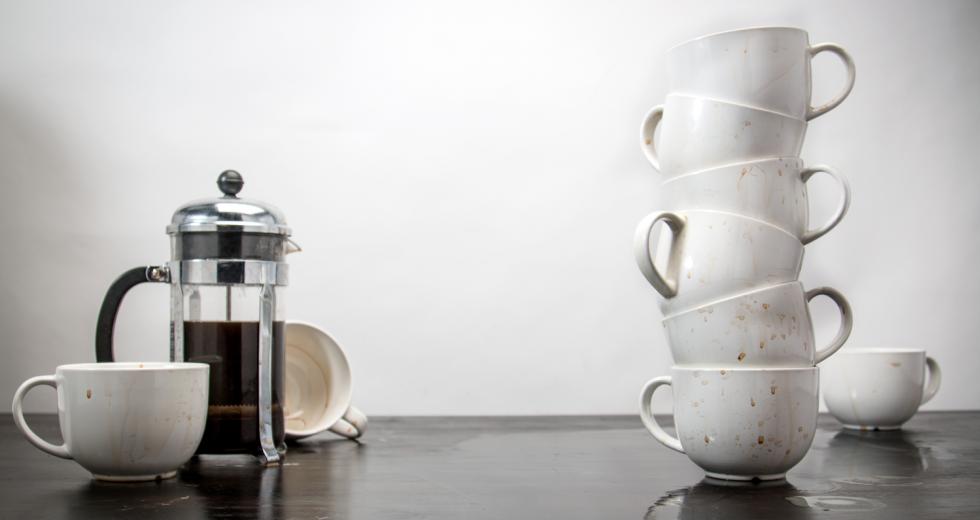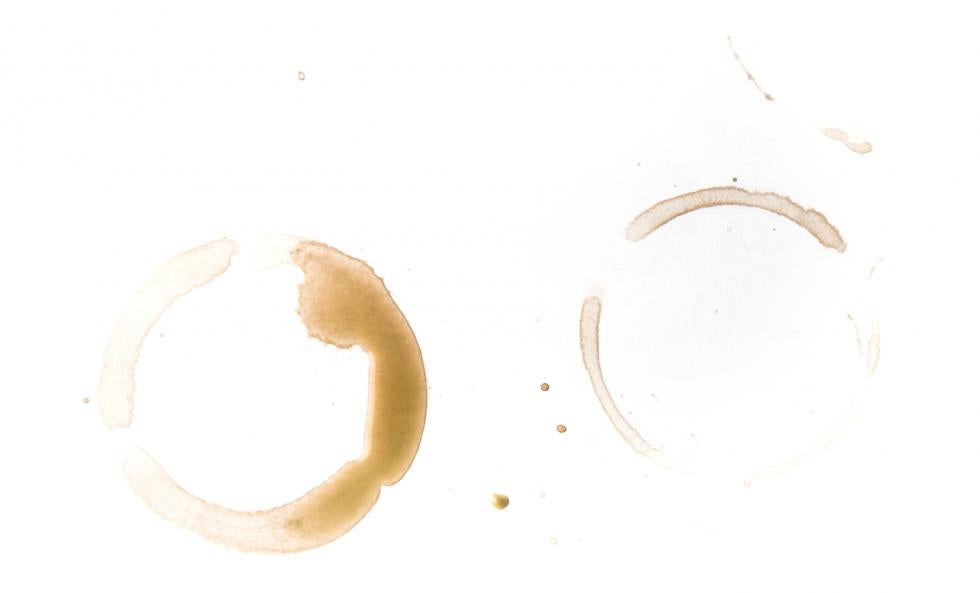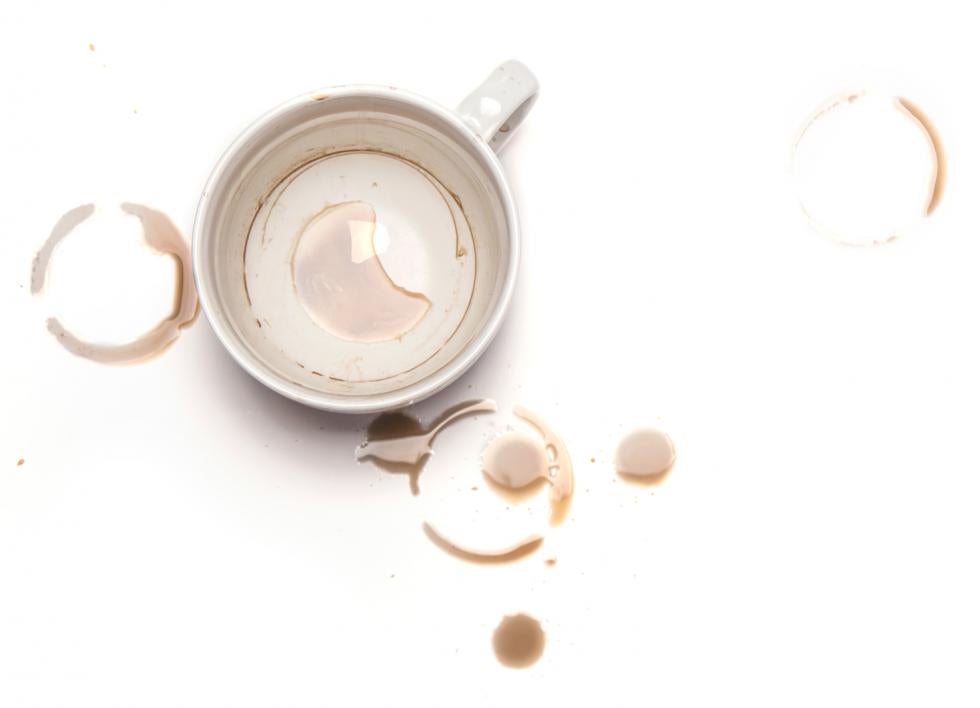Last month, I visited the dentist to get my teeth whitened. He explained how the whitening laser worked, quoted the price and then added, almost as an afterthought, “Oh, and no coffee for five days.”
“What if I use a straw?”
“No.”
“What if there’s lots of milk, so it’s almost white?”
“No.”
Jobs, homes and relationships come and go, but to coffee I have always been faithful — it had been 20 years since I’d gone a day without a cup. How would I survive? I Googled “coffee substitutes when teeth whitening,” and the two leading options were caffeine pills and a coffee enema. I considered both.
And then it hit me — I have a problem. If a friend told me, “I need to take a drug every day, and without that drug, I don’t feel normal — maybe I’ll inject it anally,” I would tell him he’s an addict.
“What if the “real me” without coffee can sleep past 7 a.m., is more relaxed and has consistent levels of energy?”
I’m not alone in my coffee addiction: 62 percent of American adults drink coffee daily, according to a 2017 report from the National Coffee Association. We drink an average of two cups a day, and much of the world drinks even more — the United States doesn’t even crack the top 20 coffee-consuming countries. Corporate culture is coffee culture. We take coffee breaks; we slog through morning emails while caffeinating; and when we network we say, “Let’s meet for coffee.” It’s the fuel to the engine of cube life.
Yet caffeine is also a drug. What are the subtle, overlooked ways that this drug is influencing our bodies? How is it affecting our sleep, our mood and our job performance? I no longer knew life without a caffeine baseline. What if the “real me” without coffee can sleep past 7 a.m., is more relaxed and has consistent levels of energy?
There was only one way to find out. In the name of research (and teeth whitening), I would go a full 10 days without coffee or caffeine. Here’s what I learned.
Days 1-3: Withdrawal Hell
I crack open my laptop and try to work. I’m a freelance writer and “digital nomad” (feel free to roll your eyes) without a permanent office, and today I’m working out of — where else? — a coffee shop, but I’m too grumpy to appreciate the irony. I scan the menu and order a sparkling water, feeling like the vegan at a Texas barbecue. It’s like I have a crushing hangover but without the upside of a fun night.
Tonya Kuhl is co-director of the fledgling UC Davis Coffee Center, funded in 2016 with help from Peet’s Coffee to “do for coffee what UC Davis has done for wine,” she says, by leveraging the university’s research engine to revolutionize post-harvest aspects of the industry (like storage and roasting). Kuhl says that coffee withdrawal comes with “mild” symptoms, characterized primarily by headaches and fatigue. To me, this feels like calling the Titanic a “mild” boating accident.
My head is pounding. I can’t focus on anything besides the cups of coffee to my left and right. (Those coffee drinkers look so happy! So alive!) Whether this is because I need coffee to focus or because I want it so badly I can’t think of anything else is a question I’m too groggy to answer.
Study after study has shown that caffeine boosts things like short-term memory, reaction times and alertness. When caffeine enters the bloodstream (which happens within 30 minutes of consumption), it worms its way into the brain, blocks something called adenosine (a chemical that causes sleepiness). Coffee may even save lives on this front: In 2013, scientists in Australia studied the patterns of a thousand truck drivers and found that the coffee-drinking truckers were 63 percent less likely to crash.
It would be nice if these withdrawal symptoms were offset by the gains from shedding coffee’s negative impacts, and Kuhl points to sleeplessness as a primary drawback. Usually I’m a fidgety sleeper, wake up earlier than I would like and am unable to nap. Without coffee, I thought maybe I’d finally get a solid eight hours, yet my sleep remains unchanged. The only difference is now when I awake, it’s without hope.
And beyond that, I can’t find many drawbacks. Coffee has been largely cleared as a culprit for cancer — Kuhl (who is also a chemical engineer) says the presence of known carcinogens is “very small.” According to the Mayo Clinic’s website: “Recent studies have generally found no connection between coffee and increased risk of cancer or heart disease.” It concludes, “For most people, the health benefits outweigh the risks.”
The bulk of medical research — and there’s a ton — suggests that coffee, generally, is healthy for us. It has been shown to trim the risk of liver disease, Parkinson’s disease and Type 2 diabetes. A 2012 study from the Sunnaas Rehabilitation Hospital in Norway examined people who had chronic pain in their necks, shoulders and arms when working on computers and found that drinking coffee lessened the pain.
Coffee also treats us to extra bits of dopamine — that joyous chemical we get from things like exercise, cupcakes and sex. Harvard University researchers found that people who drink two to four cups of coffee a day are 50 percent less likely to kill themselves.
Come to think of it, I do feel a bit depressed. (Normally I’m an upbeat person — even annoyingly so.) I’m currently working from Southeast Asia and have no interest in doing anything fun. Visit a temple, go on a tour, see a museum? Nope, I’ll just flop on the couch and watch Netflix, thanks.
Days 4-6: Anchorless
I begin to feel less depressed and lethargic, but realize I miss more than the physical effects of caffeine. I miss the ritual — the daily ceremony, and even romance, of gazing at that black liquid as it pours from the carafe, taking the first sip and feeling the mug’s warmth in my hand. I miss sipping coffee while reading the news. Without this ritual, I feel lost.
Barrett McBride, a Sacramento-based leadership coach and organizational development consultant, tells me that I have lost my “anchor,” something that’s critical in any workplace. “Anchors re-establish continuity and provide something people can count on in the midst of and in the aftermath of change,” she says.
Anchors are just as important in corporate environments that require teamwork. “Coffee breaks re-establish interpersonal interaction,” Barrett says. “Often people in different departments find themselves in the break room around the same time, and these are also sometimes important rituals.”
In office culture, breaks tend to happen around coffee, and breaks are valuable. A 2010 Massachusetts Institute of Technology study tracked employee performance at Bank of America’s call centers and found that when staff took coffee breaks together, they were nearly 20 percent more productive (as measured by average call time) and 19 percent less stressed (as measured by biometric sensors). What explains the results? “Strong social groups are beneficial to productivity,” explained the researchers in their study, and the coffee breaks facilitated that social bonding.
All breaks are not created equal, and simply alt-tabbing from Excel to Twitter does not give the same recharge as stepping away from the computer to let one’s mind wander. This is supported by a 2017 survey from the Institute for Scientific Information on Coffee of 8,000 coffee-drinking Europeans who were asked why they drink it at work. Forty percent of respondents said the primary reason was “to have time to pause and rest while drinking/preparing coffee,” edging out “to feel more alert” and “to feel less tired.” (The most popular response, with 56 percent: “Because I like the taste.”)
Days 7-9: Bargaining
Big milestone. I’m now one week into my misery, and by now I should be completely free of the withdrawal systems. This is the real baseline. This is the real me.
Yet I still don’t feel anywhere near my peak. I’m not sleeping better, I don’t feel more relaxed, I still have trouble concentrating and I still crave my morning anchor.
On top of this, I begin to notice a new problem — I’m struggling to fit in with group interactions. And maybe that’s not surprising, as coffee seems to have a unique ability to lubricate business conversations — like drinks on a first date. “The phrase, ‘Let’s grab a coffee and chat’ is a driver of a lot of new, collaborative activity,” Kuhl says. “Having a coffee helps people communicate more effectively, and that always helps overcome challenges and facilitate new ideas.”
I’m in Singapore for a two-day conference, and the event’s emcee instructs everyone to take a coffee break. In a classic moment of networking, the crowd breaks into little clusters around the coffee carafes, people introduce themselves, pass the cream and sugar, and they make the small talk that could lead to big talk. I watch from the sidelines, unable to participate — the nerd at the school dance.
“We know that coffee is important in the workplace,” says H. Rao Unnava, dean of UC Davis Graduate School of Management. “Business leaders we know anecdotally have said, ‘We cannot imagine any deal going through if there wasn’t coffee in the room.’”
Unnava and his wife, Vasu Unnava (also a professor with the Graduate School of Management) conducted research that suggests coffee meetings are actually more productive than the coffeeless alternatives. The professors studied two different groups of university students: one given coffee, the other not. Both groups were asked to read and discuss a news article on current events.
Afterward, the students evaluated the sessions for individual and group performance and rated the quality of the discussion. The coffee drinkers scored themselves and their groups higher. The Unnavas also had independent judges listen to the conversations and rank each comment as “relevant” or “not relevant” to the topic at hand. “The coffee drinkers were more focused,” Vasu says, “and we duplicated this a few times, and the results were checked across different groups.”
So was this a function of the psychological ritual, or the caffeine itself? The duo conducted another round of experiments, this time pitting regular coffee against decaf coffee. The caffeinated groups scored higher across the board. “What it means is that in this overworked economy, it seems that caffeine contributes to group performance by increasing alertness,” Unnava says. (I concur.)
Day 10 – Old Habits Die Hard
These types of “stunt articles” tend to share a common arc: The writer is skeptical, does the experiment anyway, and is surprised that he feels super and is actually better off, leading to an epiphany and a change in habits.
This is not one of those articles.
On day 10, I wake up without a headache and I’m no longer irritable, yet I still don’t feel like myself. I still feel low-energy. I still long for that first cup. Perhaps I need to go two weeks, a month or even a year to fully detox. Or perhaps I just prefer caffeinated me to decaffeinated me. If that’s the case, is that so wrong?
I’m oddly encouraged by what I did learn, and I don’t regret the experiment. Now I know that my noncaffeinated self is not more relaxed and he does not sleep better. I no longer worry that coffee has turned me into an anxious, sleep-deprived stress ball. I’ve confirmed that I work better — both individually and in a group — with that mug in my hand. I’ll continue to drink coffee, and now I’ll do it without any guilt.
At least my teeth are white (or a bit whiter) — for now. Within a year, they’ll be stained with coffee.






Comments
My Dental Hygienist stated that my teeth are not as white, not due to coffee; rather, due to eating blueberries, herbal tea, and other foods and drinks that can stain teeth. So, healthy stuff. I would write a brilliant comment, however, I have not had a cup of coffee yet this morning, and do not feel as bright in this hazy weather.
I'm trying to minimize coffee but still get some caffeine, mainly through black tea. Coffee just seems to stress me out, despite the boost in alertness.
At one place I worked, our coffee ritual centered around one coworker’s cubicle who had a coffee grinder. He absolutely insisted on whole bean coffee. Every day we’d get started with that and our supplies of cones and #2 filters.
We also made it interesting by encouraging team members to bring different coffee beans from local independent coffeeshops, chains and grocery stores. Most of the time the aromas were impressive.
We comically refererred to this as our Daily Grind.